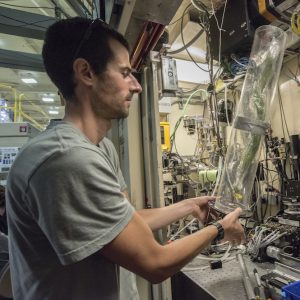Research Seminar
Cluster Hire in LFS Applied Biology, Sustainable Agriculture and the Environment, and CSFS at UBC Farm
Novel insights into the coupling of plant structure and hydraulic function: Implications for sustainable crop management
Dr. Thorsten Knipfer
Assistant Project Scientist
Department of Viticulture and Enology
University of California, Davis
Click here to fill out the Feedback Form for Dr. Thorsten Knipfer’s campus visit

Planning for climate change and making agricultural production more sustainable requires a holistic understanding of plant physiological responses across multiple scales. In this seminar, Dr. Knipfer will talk about his ongoing research using in-vivo approaches to study xylem stress physiology and the role of roots and leaves in protecting long-distance transport. Using X-ray computed microtomography, he will present novel insights into the coupling of vessel cavitation and discharge of stored xylem water and the mechanism of embolism repair in intact plants. Subsequently, he will talk about the impact of environmental stress on root structure and hydraulic function, and I will introduce how pressure-probe technology can help us measure these responses. I will conclude by emphasizing the importance of determining stress thresholds at the root, stem, and leaf level for understanding crop performance and developing sustainable management strategies in BC, and the need for high-throughput measurements of plant physiological responses.
When and Where?
- June 12, 2019 from 11:00 a.m. to 12:30 p.m.
- McLeod Building, Room 254
About the Presenter

Dr. Thorsten Knipfer, UC Davis
Dr. Thorsten Knipfer was born in Bavaria, Germany. In 2007, he completed his Diploma at the University of Bayreuth, Germany, working on water uptake of corn roots using pressure-probe technology. Thereafter, he moved to Dublin, Ireland, to start a PhD at the University College Dublin investigating the role of aquaporins in water uptake and their involvement in regulating whole-plant water flow in barley. In 2011, he started a PostDoc at the University of California, Davis, USA, together with Profs. Kenneth Shackel and Mark Matthews. During his research he investigated cellular water relations and water transport dynamics of grape berries. In 2013, he transitioned to Dr. Andrew McElrone’s lab at UC Davis to study xylem hydraulic function using X-ray computed microtomography. In his current position as Assistant Project Scientist at UC Davis, his work focuses on xylem stress physiology and the screening of walnut rootstocks for drought resistance.
This seminar is part of the LFS Applied Biology Faculty Cluster Hire in Sustainable Agriculture and the Environment. Nine short-listed candidates will be giving seminars in May and June as part of their intensive interview process. Click here see a full list of events.